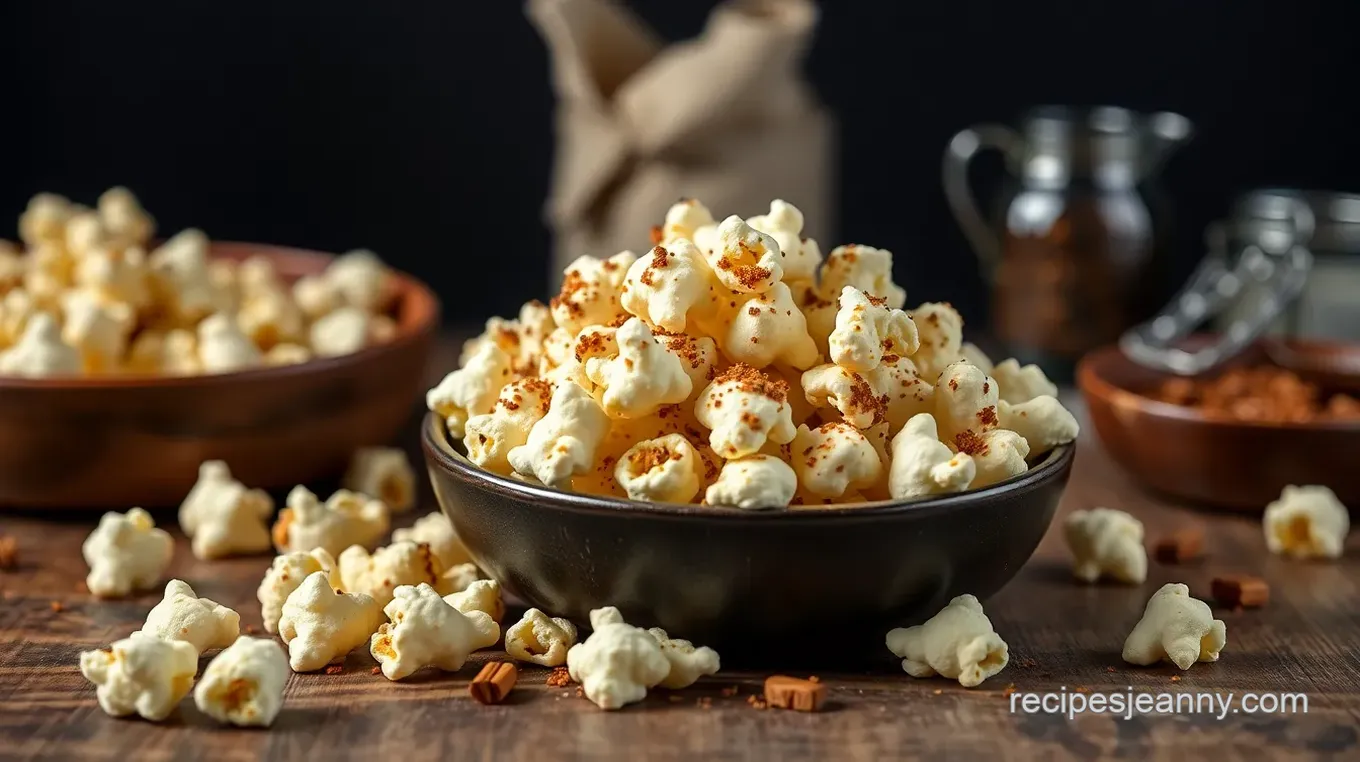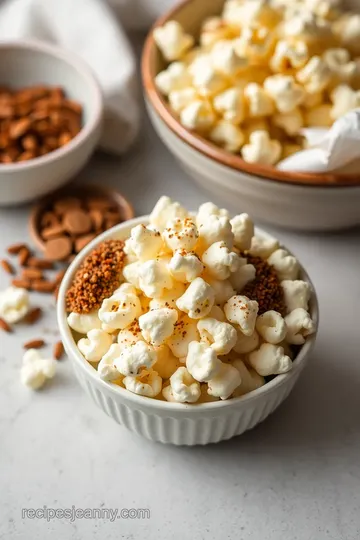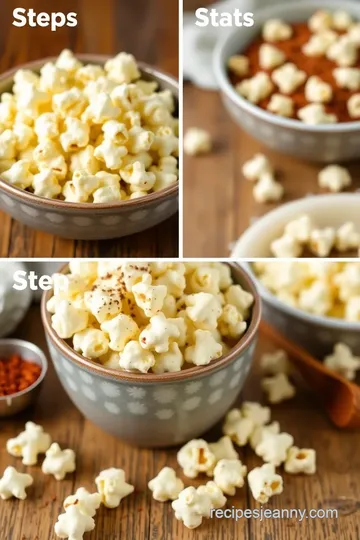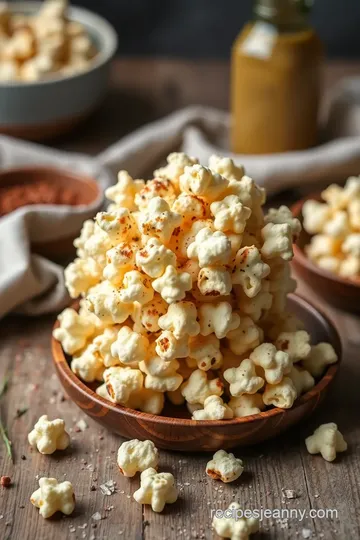Flavors Burst Popcorn: Quick & Tasty Seasoned Snacks
Discover how to make Quick Popcorn with Flavorful Seasonings that's perfect for movie nights! Choose from cheesy, spicy, or sweet blends. Get tips now!

- Snack Attack: The Magic of Quick Popcorn with Flavorful Seasonings
- A Popcorn Tale: Where It All Began
- Why This Recipe Rocks
- Serving Up Happiness
- Your Essential Ingredients Guide: Elevate Your Snack Game
- Getting to Know Professional Cooking Methods
- Additional Recipe Information
- Frequently Asked Questions
- Recipe Card
Snack Attack: The Magic of Quick Popcorn with Flavorful Seasonings
You ever find yourself mid-movie, the screen is filled with action, and then it hits you—hunger pangs? there's nothing worse than that.
Honestly, it’s like the universe conspiring against your movie night. but fret not, because i’ve got a game-changing solution: quick popcorn with flavorful seasonings .
This simple snack not only keeps those cravings at bay but also turns your average popcorn into a gourmet experience.
Picture this: it’s a friday night, your favorite movie is queued up, and you suddenly remember the classic popcorn you've been neglecting.
So you pop it up and sprinkle on some tasty seasonings. boom! you've just transformed your movie snacks at home into a flavor explosion.
Now, who wouldn’t want that?
A Popcorn Tale: Where It All Began
Did you know popcorn has a story that goes way back? it’s been enjoyed for centuries, originally popping in south america well before it became a staple in american culture.
Fast forward to today, and popcorn isn’t just a snack; it’s an art form . from classic buttered goodness to inventive gourmet popcorn recipes, this delightful treat is more popular than ever.
Making quick popcorn with flavorful seasonings couldn’t be easier! it takes around 15 minutes to whip up, and i’d say it’s a solid easy level on the cooking scale.
Plus, it costs peanuts (pun intended)! you can make enough to serve four—but i usually end up eating half myself.
Let’s be real: who can resist that crunch?
Why This Recipe Rocks
Let’s chat about the key benefits of this delightful snack. first off, healthy popcorn alternatives can be a cinch with this recipe.
Popped corn is high in fiber and if you go light on the toppings, it can be low-calorie too! talk about snack goals.
The versatility is unreal! you can mix and match homemade popcorn seasoning blends based on your mood. want something cheesy? sprinkle on some parmesan.
Feeling spicy? bring out the chili powder! sweet tooth calling? try brown sugar and cinnamon. this easy popcorn seasonings guide is your ticket to creative popcorn flavors that will make every movie night a hit.
And don’t think this is just for your friday night flicks. this is a fab recipe for birthdays, sports gatherings, or even a cozy evening with a good book.
You know, a little something for those me-time moments.
Serving Up Happiness
Need more reasons to love this popcorn? it offers total fun when you crank up your cooking creativity. it’s kid-friendly, which is a huge plus during those endless weekends.
You can experiment with unique popcorn toppings and invite the kiddos to join in the fun of mixing their custom popcorn flavoring.
Trust me, they will love being little chefs!
Plus, it’s an excellent way to use up those pantry staples. Have some leftover herbs? Toss them in! Want to go crazy with spices? Do it! This isn't just about making popcorn; it’s about making memories—seriously, who doesn't enjoy a good snack while binging their favorite show?
Alright, enough talk! Let’s get to what you really came for: the ingredients for your flavorful adventure.

Your Essential Ingredients Guide: Elevate Your Snack Game
Let’s talk popcorn. i mean, who doesn’t love it? it’s classic comfort food, perfect for movie nights or just snacking while binging that latest hit show.
This guide is all about leveling up your popcorn experience, especially with a quick popcorn with flavorful seasonings recipe that’s bound to impress your friends and family.
Grab your kernels—it's gonna be a tasty ride!
Premium Core Components
First and foremost, let's get back to basics. You want quality ingredients to make your popcorn shine.
-
For this recipe, you'll need 1/2 cup (120 ml) of popcorn kernels and 2 tablespoons (30 ml) of vegetable oil or coconut oil.
The secret to a great pop? good kernels! look for those labeled “fresh” in your store.
-
Check for quality indicators : your kernels should be firm and not have many chips or cracks. store them in a cool, dark place for up to 6-12 months .
Yes, fresh kernels are key to a good pop!
-
As for freshness tips ? give them a little shake in the bag. hearing a nice rattling sound? that’s a good sign! if they sound too soft, they might be past their prime.
Signature Seasoning Blend
Now, let’s layer in those flavorful seasonings ! The beauty of popcorn is its versatility. So, let's spice it up!
-
Classic Salt will always hit the spot—just 1 teaspoon (5 g) of sea salt will do.
-
Want to rev it up a notch? Grab 1/4 cup (25 g) of grated Parmesan cheese and 1/2 teaspoon (2 g) of garlic powder for a cheesy delight that’s hard to resist.
-
Looking for a kick? 1 teaspoon (2 g) of chili powder alongside 1/2 teaspoon (1 g) of cayenne pepper brings that spicy zing .
-
Sweet tooth in the house? mix together 2 tablespoons (25 g) of brown sugar and 1/2 teaspoon (1 g) of cinnamon for a sweet and savory combo that’ll have you coming back for seconds.
-
You can even toss in 1 tablespoon (5 g) of dried herbs like oregano or thyme. It’s an herbal medley that adds unexpected layers of flavor.
Smart Substitutions
Don't have everything on hand? No worries!
Common alternatives can work wonders. For instance, if you’re missing Parmesan, try nutritional yeast for that cheesy vibe—totally vegan and a hit with friends!
For dietary modifications , remember you can use olive oil or avocado oil instead of vegetable oil, and even air-popped kernels if you're looking for a healthier popcorn alternative .
Facing a midnight craving and out of seasonings? Toss in whatever you have—think taco seasoning or even ranch powder. Really, the sky's the limit!
Kitchen Equipment Essentials
To get your popcorn popping, you need only a few must-have tools . a large, heavy-bottomed pot with a lid is perfect for heating.
But if you want the fast lane, a popcorn maker will give you delightfully quick popcorn for those movie nights at home.
You’ll also need measuring cups and spoons. don’t skimp on them! precision can make all the difference in your popcorn flavoring .
A large mixing bowl to toss your popcorn in is a must, along with a wooden spoon or spatula to mix everything up.
And listen—it’s all about storage solutions too. Keep your popcorn in an airtight container after popping to maintain that perfect crunch.
So now that we’ve covered the essentials, I’m thrilled to walk you through the recipe! We’re about to make a flavors burst popcorn that you can customize exactly to your taste.
Just think about it: quick and easy popcorn recipes that delight your taste buds await! whether you’re after cheesy popcorn snacks , spicy popcorn recipes , or a fun sweet treat, this guide will help you unleash your inner popcorn connoisseur.
Now, let’s dive into those instructions to whip up your own batch of flavored popcorn snacks!

Getting to Know Professional Cooking Methods
Let’s dive right into the world of professional cooking techniques ! ever wonder how chefs whip up those gourmet dishes that make you go, “wow!”? it starts with a few essential steps that even home cooks can master.
Essential Preparation Steps
First off, we’ve gotta talk about mise en place . this fancy french term just means "everything in its place." before you even think about cooking, gather all your ingredients.
Wash 'em, chop 'em, and measure 'em. i can't tell you how many times i’ve been halfway through a recipe and realized i forgot to grab the salt.
Classic rookie move!
Time management is key. picture this: you’re racing against the clock, trying to finish dinner before your favorite show starts.
Yeah, that’s stressful. so, set a timer for each step. like, if something takes 10 minutes , definitely keep an eye on it!
Then there's organization strategies . keep your workspace tidy. that way, when you grab the garlic, you won’t knock over the milk.
Trust me; i’ve been there. and safety considerations ? always handle knives with care and use oven mitts when dealing with hot stuff.
No one wants a trip to the er in the middle of dinner prep!
Step-by-Step Process
Alright, let’s get into the nitty-gritty with some clear, numbered instructions. Ready? Let’s pop some corn!
-
Heat the Oil : In a large, heavy-bottomed pot, heat 2 tablespoons of vegetable oil over medium-high heat.
-
Pop the corn : add 3-4 popcorn kernels , cover, and wait for them to pop. this tells you the oil is ready.
Once you hear popping, pour in 1/2 cup of popcorn kernels in a single layer. cover it up and give it a gentle shake.
-
Watch the Timing : Keep the lid on until popping slows down to 2-3 seconds between pops. That’s your cue to take it off the heat!
-
Season the popcorn : transfer that glorious popcorn to a big bowl. while it's still hot, sprinkle your chosen seasoning—like that classic salt or maybe you’re feeling adventurous with a cheesy delight blend.
Toss it like you mean it!
-
Serve It Up : Enjoy it right away! If you’ve made too much (is there such a thing?), store it in an airtight container.
Temperature control is crucial—make sure you're on the mark, and you'll end up with fluffy, delicious popcorn!
Expert Techniques
Now, let’s talk about those expert techniques that separate the pros from the home cooks. sometimes, it’s all in the small details.
For instance, while you’re busy popping corn, make sure the kernels are fresh! stale ones don't pop well, and we want a good batch, right?
Quality checkpoints ? always taste as you go. it helps tremendously! if something’s off, it’s easier to adjust earlier than later.
And let’s not forget troubleshooting tips. if your popcorn comes out chewy instead of crunchy, it might have been overcooked—too much heat was your fault!
Success Strategies
Want to impress your friends with quick popcorn with flavorful seasonings ? here’s the scoop on avoiding common mistakes. don’t skimp on oil, and don’t cover your pot too tightly.
Let steam escape! also, always sprinkle seasoning while the popcorn is hot for maximum flavor absorption.
Quality assurance ? Check your popcorn for uniformity—each piece should be coated evenly. If it’s clumping or soggy, it’s time to adjust your technique.
Lastly, don’t forget about make-ahead options . if you’re prepping for a movie night or game day, you can whip up a batch earlier in the day.
Just hit it with a little extra seasoning before serving to bring the flavor back to life!
Popcorn is such an awesome snack, with so many flavor possibilities. and if you're looking to take it up a notch, experiment with all kinds of seasonings like spicy or sweet! because at the end of the day, it’s all about having fun with simple recipes.
So, if you’re ready to get cooking, grab your kernels and let’s make some gourmet popcorn recipes that will wow your guests during movie nights, ha! and remember, the best popcorn topping ideas come from your imagination.
So feel free to experiment!
Additional Information
If you’re still craving a bit more, i've got ideas up my sleeve for festive popcorn recipes and innovative flavors .
Stay tuned, because we’ll explore how to turn your plain popcorn into a snackable masterpiece that’ll make you the star of any game night or movie party!

Additional Recipe Information
Alright, grab your favorite bowl and let’s dive into some quick tips and tricks to elevate your popcorn game with our quick popcorn with flavorful seasonings .
You know, snacking on popcorn doesn’t have to be plain ol’ butter and salt anymore—oh no!
Pro Tips & Secrets
Here’s the deal: chef jack , my buddy who’s basically a kitchen wizard, once told me that fresh kernels are the secret to fluffy popcorn.
Seriously, use fresh popcorn kernels for a popping party!
Need a time-saver ? try pre-measuring your seasonings and storing them in little jars. just shake and go when the craving hits! and speaking of flavor, always season while your popcorn is hot.
It helps the spices stick better and allows for a flavor explosion – nobody wants to eat dry popcorn, am i right?
Don’t forget about presentation ! use a fun bowl, maybe even mix a couple of colors of popcorn, like white and caramel.
It’s all about those little touches that wow your friends. when you serve it, sprinkle a bit of extra seasoning on top—trust me, they’ll appreciate the gesture!
Perfect Presentation
When it comes to presentation, less is more . you don’t need a lot to amp up your popcorn’s look. just a simple plating technique can do wonders.
Use a wide bowl or even a parchment paper cone for a casual vibe. it’s kinda like taking a page from those gourmet popcorn shops.
Thinking of some garnish ideas? try a sprinkle of chopped parsley or some dried herbs . they'll not only add color but also an aromatic touch.
And let's be real, who can resist that?
Mixing and matching colors with your seasonings can also make things pop! How about some bright pink Himalayan salt with classic white popcorn? It’s like a little festival for your eyes!
Storage & Make-Ahead
Now, if you find yourself with leftover popcorn , no worries! just keep it in an airtight container. hand's up on how long it lasts? about 2-3 days if you’re lucky! any longer, and it might start feeling a bit sad and stale.
For longer storage, consider freezing it, but then it loses that nice crunch.
Thinking ahead? this popcorn is perfect for make-ahead . pop a big batch for your movie night today, and you can grab it during the week when those late-night snack cravings hit.
Just remember to store it right to avoid any chewy sadness!
Creative Variations
Here’s where the fun comes in! Feeling adventurous? Amp up your popcorn game with creative variations :
- For a sweet twist , think about mixing brown sugar and cinnamon—yum!
- If you’re into spicy , add some cayenne pepper for a real kick. I'm talking fire-breath level here!
- Got dietary restrictions? No problem! Use nutritional yeast instead of cheese for a vegan treat that packs a punch!
For seasonal flavors, try adding pumpkin spice in fall, or some zesty lime zest during summer. It’s all about experimenting with those popcorn seasoning recipes to find your perfect match!
Complete Nutrition Guide
You can't forget nutrition, right? While popcorn might be your guilty pleasure, it can be a healthy snack alternative ! Popcorn is actually a whole grain and can pack in some fiber – two thumbs up!
A serving might clock in at around 150 calories with a few grams of protein. it's low in fat, but, of course, depending on your chosen seasonings, that can change.
For those looking to balance calories , remember to keep an eye on portions and seasoning amounts.
Wrap It Up!
So there you have it: a guide full of tasty popcorn ideas and handy tips. whether it’s for snacks during game night or just a quick fix while binge-watching your favorite show, this quick popcorn with flavorful seasonings is a game-changer.
Experiment with different flavors, share with your friends, and most importantly, enjoy every tasty bite. let the popcorn party commence!
Frequently Asked Questions
What is the best way to store Quick Popcorn with Flavorful Seasonings?
To keep your Quick Popcorn with Flavorful Seasonings fresh, store it in an airtight container at room temperature. This will help maintain its crunchiness for up to 3 days. If you want it to last longer, consider refrigerating it, but be aware it may lose some crispness.
Can I use different oils for popping the popcorn?
Yes! You can experiment with various oils for popping such as coconut, olive, or even avocado oil. Each will impart its unique flavor to the popcorn, enhancing your overall snacking experience. Just be sure to use oils with a high smoke point for the best results.
How can I make the seasonings stick better to my popcorn?
To ensure the seasonings adhere well to your popcorn, drizzle melted butter or a flavored oil over the hot popcorn just after popping. This not only improves adhesion but also adds an extra layer of flavor. Toss thoroughly to evenly distribute the seasonings.
What are some creative seasoning ideas for my Quick Popcorn with Flavorful Seasonings?
The possibilities are endless! Apart from the suggested seasonings, you could try adding spices such as smoked paprika for a smoky kick, or blend sweet and savory flavors by using cinnamon and chili powder together. You can also add a drizzle of honey for a delicious sweet touch or sprinkle with your favorite herbs for freshness.
Is Quick Popcorn with Flavorful Seasonings healthy?
Popcorn can be a healthy snack, especially when air-popped and seasoned minimally. The nutritional information varies based on the oil used and the type of seasonings added. For a healthier option, opt for lighter seasonings like herbs and reduce the salt or cheese.
Can I make Quick Popcorn with Flavorful Seasonings in advance?
While it's best enjoyed fresh, you can prepare the popcorn in advance. Just ensure you let it cool completely before storing it in an airtight container. However, be cautious as the texture may soften over time, especially with cheese-based seasonings.
Flavors Burst Popcorn: Quick & Tasty Seasoned Snacks Card

⚖️ Ingredients:
- 1/2 cup popcorn kernels (120 ml)
- 2 tablespoons vegetable oil (30 ml) or coconut oil
- 1 teaspoon sea salt (5 g) for Classic Salt
- 1/4 cup grated Parmesan cheese (25 g) for Cheesy Delight
- 1/2 teaspoon garlic powder (2 g) for Cheesy Delight
- 1 teaspoon chili powder (2 g) for Spicy Zing
- 1/2 teaspoon cayenne pepper (1 g) for Spicy Zing
- 2 tablespoons brown sugar (25 g) for Sweet & Savory
- 1/2 teaspoon cinnamon (1 g) for Sweet & Savory
- 1 tablespoon dried herbs (oregano, thyme, or rosemary) (5 g) for Herbal Medley
🥄 Instructions:
- Step 1: In a large pot, add vegetable oil and heat over medium-high heat.
- Step 2: Add 3-4 popcorn kernels and cover the pot. Wait until you hear them pop, indicating the oil is hot enough.
- Step 3: Once popped, add the rest of the popcorn kernels in an even layer, cover, and shake the pot gently.
- Step 4: Continue to pop until the popping slows down to 2-3 seconds between pops. Remove from heat.
- Step 5: Transfer popcorn to a large bowl.
- Step 6: While hot, sprinkle your chosen seasoning blend evenly over the popcorn.
- Step 7: Toss the popcorn using a wooden spoon or your hands (be careful of the heat) to distribute the seasoning thoroughly.
- Step 8: Enjoy immediately or allow to cool and store in an airtight container for later.
Previous Recipe: Quick & Crunchy Homemade Toasted Bread Crumbs in 10 Minutes
Next Recipe: My Favorite Blend Pineapple Smoothie for Quick Energy Boost
